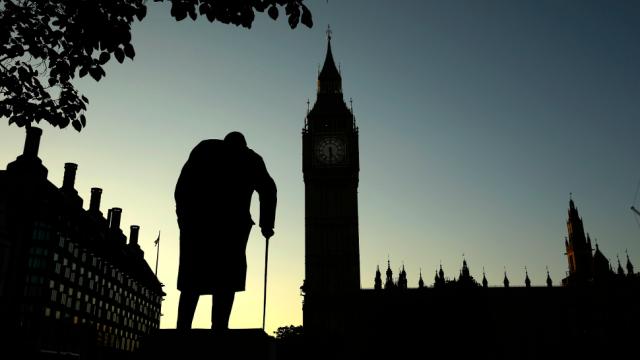Britain is saying goodbye to the European Union, a monumental decision that’s triggering some serious alarm bells among the country’s researchers. Here’s why they have a right to be worried.
A statue of Winston Churchill is silhouetted against the Houses of Parliament and the early morning sky in London, Friday, 24 June 2016. (Associated Press)
For months, scientists and environmentalists in the UK have been warning about the consequences of a Brexit. And now it’s actually happened. It will likely take a couple of years for Britain to negotiate its way out of the EU, but researchers around the country are already worried about what this divorce means to them, their jobs and the state of the British union.
No doubt, Britain’s historic decision to extricate itself from the European Union is poised to have a pronounced effect on science funding, research, regulation and the environment.
“This is a poor outcome for British science and so is bad for Britain,” declared Paul Nurse, a Nobel-prize winning geneticist, to a group of journalists. He said that British scientists will now have to figure out a way to “counter the isolationism of Brexit if our science is to continue to thrive”, adding that science “thrives on the permeability of ideas and people, and flourishes in environments that pool intelligence, minimise barriers and are open to free exchange and collaboration”.
Nurse is one of hundreds of scientists who nervously awaited the outcome of yesterday’s referendum. In the months preceding the vote, droves of British scientists voiced their opinions on the matter, arguing that a Brexit vote would be potentially disastrous to science in the UK and the EU at large. Back in March, the Times published a passionate pro-Remain letter that contained the signatures of more than 150 researchers from the University of Cambridge. Polls showed that nine out of 10 university staff backed the Remain camp, and that 40 per cent might leave the UK should the Brexiters win. Stephen Hawking also chimed in, saying that staying in the EU is vital for Britain’s economy and security, and that Britain risks being isolated.

Academic institutions in the UK are now in serious limbo. Around 18 per cent of the UK’s funding from the EU goes to scientific research and development. If the British government can’t find a way to make up for this shortfall, that could lead to some serious job losses and the outright termination of certain research programs. Prior to the vote, the Digital Science group estimated that the UK could lose £1 billion ($1.8 billion) in science funding annually.
The UK is also in danger of losing access to some major EU research programs, including the Horizon 2020 program of research grants. That’s not to say that Britain can’t find ways to stay within these programs and others. Assuming that Britain still has the will and financial means to stay within these programs, it could still continue to work alongside its former EU partners.
Jonathan Butterworth, a British physicist who works on the ATLAS experiment at the Large Hadron Collider near Geneva, Switzerland, says that the Brexit is “going to be very damaging”, and demands that the British government come up with real solutions to ensure that “the level of research and education funding that was coming through the EU will be guaranteed”.
In defence of the Brexit, Conservative justice minister Michael Gove noted that the money normally given to the EU by the UK could now be channelled into science. It’s an encouraging thought, but one that will have to be translated into action. Others are hopeful that the Brexit could free Britain to do more exploratory forms of scientific research. An advisor to Gove, Angus Dalgleish, believes the Brexit is good for the UK in this regard in that it will remove some restrictive EU regulations on scientific research.
Another perk of EU membership is the freedom of citizens of member states to work and go to school in each other’s country without restrictions. There’s a fear that many of these individuals will either be forced out of the UK, or simply choose to leave. That could lead to a serious “brain drain” given that 15 per cent of all university staff in the UK come from the EU, and that around five per cent of all students are from other European countries. The University of Cambridge in particular could be hard hit as 23 per cent of its research scientists are from other EU countries. It’s also not clear how the Brexit will affect British scientists working abroad.
“I hope that ways will be found to reassure all those non-UK EU citizens who work in science or the NHS that their futures are secure here, and that we will make sure that whatever happens the UK remains an attractive place for others to come and help take medical science and the NHS forward,” noted Simon Wessely, president of the Royal College of Psychiatrists, in The Independent.
The Royal Astronomical Society is particularly concerned about pending travel restrictions:
UK and European science benefit from the free movement of people between countries, something that has allowed UK research to become world leading. Although for example membership of the European Space Agency and European Southern Observatory is not contingent on EU membership, these organisations depend on international recruitment made easier by straightforward migration between countries. We therefore urge the Government to ensure it remains straightforward for UK scientists to travel and work in EU countries, and for EU scientists to come to the UK.
Dame Julia Goodfellow, the president of Universities UK, said that her group’s first priority will be to convince the UK government “to take steps to ensure that staff and students from EU countries can continue to work and study at British universities in the long term, and to promote the UK as a welcoming destination for the brightest and best minds”. She reminded Britons that “leaving the EU will not happen overnight — there will be a gradual exit process with significant opportunities to seek assurances and influence future policy”.
And then there’s the environment to consider.
“The short answer to what happens next with pollution, wildlife, farming, green energy, climate change and more is we don’t know — we are in uncharted territory,” Damian Carrington wrote in The Guardian. “But all the indications — from the “red-tape” slashing desires of the Brexiters to the judgment of environmental professionals — are that the protections for our environment will get weaker.” Carrington worries that the plunging stock markets will “damage the huge investments needed to create a cleaner and safer environment”.
As it stands, many UK laws and regulations are determined by EU legislation. It’s not immediately clear which environmental protections will remain and which will be abandoned. Some environmentalists worry that Britain’s departure from the EU will result in the watering down of environmental and climate policy.
“It is therefore essential that the government gives a commitment that, in negotiating the terms of the UK’s exit from the EU, an equivalent or enhanced level of environmental protection and climate policy will be implemented here in the UK,” noted the the Institute of Environmental Management and Assessment (IEMA) in a statement.
The EU has a history of getting Britain’s environmental act together, including an injunction to clean-up its sewage-strewn beaches. The same can be said for many protections currently in place in the UK for nature and wildlife, along with an EU-driven mandate to improve recycling and waste. There’s now fear, for example, that Britain will scrap a ban on pesticides that harm bees and other important pollinators.
It’s only been a few hours since the referendum, so reactions are understandably intense and distressed. As noted, there’s still a long road ahead, and many of the concerns expressed by the scientific community are likely to be addressed in the coming negotiations. Panic is obviously not the way to go, but as many of these scientists have made painfully clear, the UK government would be making a huge mistake should they choose to ignore the needs of this crucially valuable sector of British society.
[Nature 1, 2, Wired, The Independent, The Guardian]
